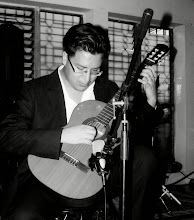
When you're into music, you're always finding (or at least trying) new musical ways of expression and forms. Like any other art, that's the way you master it. Experimenting, expanding, contracting, and once again, expanding.
Many of us musicians-to-be lack this "gung ho" sort of attitude required. Many of us don't. That's what made old school rock quite different than today's.
So anyway... today I'll gonna write 'bout one of my favourite bands. In the past I just talked 'bout the guitar player, but I kinda feel like I should write 'bout the band as well. The band name is King Crimson.
Formed in January 1969, Crimson is one of those bands you never get tired of listening (If you're really a true fan at least). In their beginnings, their sound was quite an adventurous mix of jazz, rock, and odd time signatures. At the time, no one have dared to play such things. The reference point for every musician in the U.K. who wanted to do something "progressive" was the Sgt. Pepper album created by The Beatles.
In fact, that was the album that encouraged a young man to explore the boundaries of dissonance, and chords. The name of this young man was Robert Fripp, who in first place had no band at all. At the time, he was more of an Economics college student at the time, helping his father with the business he ran. On the other hand, he had quite a formal training in guitar playing, and by the time he was in his late teens, had played in some orchestras as well... That's something you definitely don't see nowadays.
The chance that let Fripp start his musical endeavours came through an ad put by Michael and Peter Giles, who were seeking a singing organist. But, instead they found a non singing guitarist. They called themselves "The Cheerful Insanity of Giles, Giles and Fripp". Later on, more people joined the band, Ian McDonald, Pete Sinfield, and finally Greg Lake, and Peter Giles left. The classic lineup of King Crimson was ready on January 13, 1969.
The name King Crimson was coined by lyricist Peter Sinfield as a synonym for Beelzebub, the Prince of Demons. According to Fripp, Beelzebub would be an anglicised form of the Arabic phrase "B'il Sabab", meaning "the man with an aim" – although it literally means "with a cause"
In the Court of the Crimson King, is the first album released by the band. Described by some rock legends as uncanny masterpiece, this is the record that "sensitive ears" who were dwelling into psychodelic experiences were shocked with. It contains one of the most challenging music ever made by a band, comprised by people between 23 and 28 years old. It is AMAZING.
- From their Hyde Park performance.
Later on, this - to me is the best - lineup disbanded, due to Greg Lake's departure to form Emerson Lake and Palmer, and Michael Giles retirement from music. Although, they performed for the next album, called In the Wake of Poseidon. It's a great album, just like its predecessor, although many people saw it just like an "extension" of the debut release.
So, since then King Crimson went through a lot of lineup changes, where they released another albums that personally I don't like but anyway, they came back to a strong sound.

This lineup consisted of Bill Brufford, Jamie Muir, David Cross, John Wetton and of course, Robert Fripp. Robert Fripp is the "Architect" behind this band, actually.
The first album they released with this lineup was "Lark's Tongues in Aspic". A very beautiful album, it starts with an angry Lark's Tongues in Aspic part I, abrassive from start to end.
But this lineup, came to an end in 1974. That's the year when Robert Fripp called it quits, and Crimson released one of the most amazing songs ever made, the epic Starless...
- This song put an end to an era where Crimson was very driven by fiercy jazz rock and experimentation, opening the gate for another new and interesting era for the band...
In the 80's, the musical scene was dominated by New Wave. In the 80's the Crimson King came back, with a total different lineup. With the exception of Bill Bruford taking the role of drummer again, the rest were quite well known musicians. Adrian Belew, the soloist, played before with Frank Zappa, and Tony Levin, the bass player, plays with Peter Gabriel since his first solo album. A superband, you might say.
- Good Stuff, isn't it?
For a brief time, this was King Crimson's most stable lineup. In further versions, they added 2 people more to the band, creating what Fripp would call "The Double Trio Band"... and as usual, it surpassed any expectations of King Crimson's fans. The new additions to the band were Trey Gunn on Warr Guitars and Pat Mastelotto on percussions. This lineup brought more like an Industrial Crimson kind of sound, heavy but also quite heavenly.
Then, the power Trio just became a quartet, with the temporal departure of Tony Levin and Bill Bruford, leaving a more sonic escaping Crimson begin.
In any case, the story of this band is one of the most interesting ones amongst rock history. One that seems to never end... as long as his leader, Robert Fripp (who I deeply admire) is alive.
Thanks for teachin' us young people how innovative a rock band could be... Crimson King

To me, King Crimson is still the best band in the world.
ReplyDeleteWithout a Doubt ! I've learned to appreciate the different Crimson lineups !
ReplyDelete